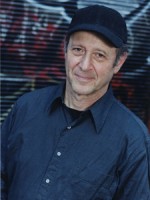Title
Nearly five years ago, the new-music ensemble Axiom performed its first full concert for a small audience in a Juilliard rehearsal room. The final work on the program was City Life by Steve Reich (’61, composition).
Body
On December 9 at Alice Tully Hall, in a performance pointedly juxtaposed with Axiom’s modest beginnings, the group celebrates the composer’s 75th birthday (which actually falls on October 3, 2011) with a program that includes two of his most unique and influential works, Triple Quartet and Music for 18 Musicians. The bill highlights the musical growth of the young ensemble while paying homage to the brilliant composer whose music accompanied its inception.
Calling the ensemble’s growth “overwhelming,” its director, Juilliard faculty member Jeffery Milarsky, said, “Axiom has developed just by having each concert add to the depths of what is musically possible for [it]. This concert is an incredible opportunity to return to Reich’s music, which has been influential to musicians and listeners in innumerable ways.”
The ensemble developed the program in collaboration with Reich; Triple Quartet—commissioned and premiered in 1999 by the Kronos Quartet—opens the concert. It exists in two versions: in the first, a live string quartet performs with two prerecorded string quartets; the second, which Axiom will perform, was written for three live quartets. (This version was first heard at a concert given in 2000 by the New Juilliard Ensemble conducted by its director, faculty member Joel Sachs.)
Both versions are rarely performed, which, according to Milarsky, was one reason for the program choice. The other was to celebrate the rich history of quartet performance and string pedagogy at Juilliard. “So many incredible quartets have been associated with Juilliard,” he said. “Clearly the Juilliard String Quartet has been one of the most important groups in the School’s history, but countless teachers, resident ensembles, and students have also helped define Juilliard’s excellence in string playing. We programmed [Triple Quartet] as an homage to this tradition.”
The 55-minute Music for 18 Musicians (1974-76), which comprises the program’s second half, is one of the seminal works of the 20th century. Justin Brown, the ensemble’s artistic coordinator and the Juilliard Orchestra manager, said that its inclusion on the program was “driven almost entirely by student interest”: Reich’s music is by far the most requested by students suggesting repertoire for Axiom. Milarsky notes that Music for 18 is not only “hip and trendy” but that it also “redefined for an entire generation of listeners how to hear music.”
In a program note for the first edition of the score, Reich wrote that Music for 18 is rhythmically based on “two kinds of time occurring simultaneously. The first is that of a regular rhythmic pulse in the pianos and mallet instruments that continues throughout the piece. The second is the rhythm of the human breath in [amplified] voices and wind instruments.” These elements are presented in varying proportions throughout the work’s 11 sections, exploiting different acoustic and instrumental combinations over a steady, unwavering pulsation.
“This work is inspired and sophisticated, and it provides a listening experience unlike almost anything else in music,” Milarsky said. “Reich is forever young, forever hip. This music takes you on a unique journey.”





